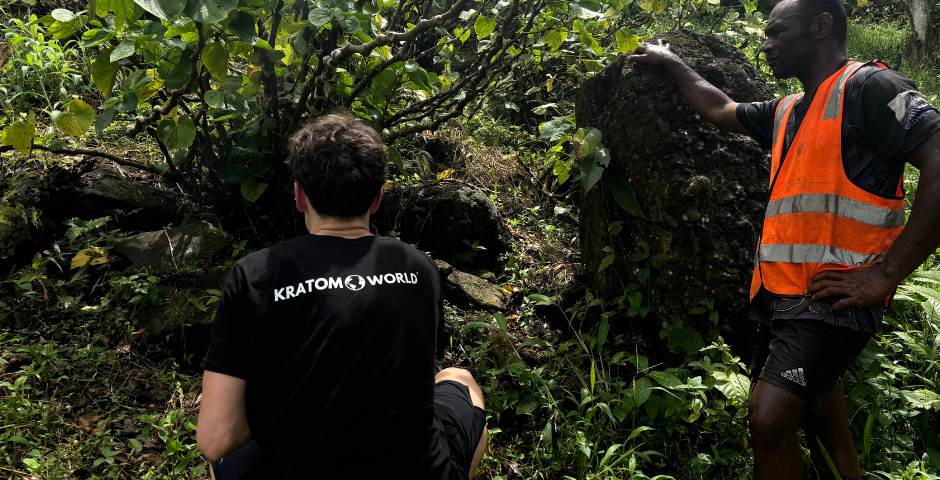Your Cart is Empty
Shipping is free on orders over €60!
Shipping is free on orders over €60!

We bring you an exclusive report from our trip to a partner farm where we cultivate the raw material kava kava (Piper methysticum), also known as the intoxicating pepper plant. This plant, traditionally used for its relaxing effects, is cultivated on the remote Fiji Islands in Oceania.
Our journey began at Václav Havel Airport in Prague. After our first flight to Dubai, we boarded a long, 15-hour flight to Sydney, Australia. After a tiring journey, we stayed here for the day, got some work done, and briefly explored the city. We visited the Opera House, the Botanical Gardens, and the famous Bondi Beach.

The jet lag (10 hours) was taking its toll, but we still had one more flight ahead of us – this time a four-hour flight to Fiji, specifically to Nadi International Airport. After an overnight stay in a hotel near Nadi Airport, we continued to the domestic airport, from where we flew to the island of Taveuni in an old propeller plane. Before the flight, we had to weigh not only the luggage but also the passengers for the safety of the small aircraft. There were only a few seats on the plane, and we sat directly behind the pilot, overlooking the cockpit. Although the boarding door was slightly ajar, the flight went smoothly – we had the opportunity to observe Fiji's tropical islands, the ocean, and the lush vegetation from above and enjoy the breathtaking views. The locals didn't seem as scared as we were, but they were excited that white people like us were traveling to unusual places that tourists wouldn't just visit.

Upon arrival, we were greeted at the plane by our farmer and partner, Noel. Together, we took a boat to Matangi Island, where he welcomed us with breakfast and accommodated us at his resort. After a short break, we set off on a smaller boat to the secluded island of Qamea, where our kava kava is grown. The journey to the plantation itself led through the jungle and took about an hour over difficult terrain.

The kava kava plant must grow for at least five years before it is ready to harvest. Harvesting occurs by pulling out the entire bush, including the roots. The plant is destroyed and a new one is immediately planted in its place. Our farm has approximately 2,000 bushes, which are gradually being replaced.

Young kava kava bushes are grown alongside the taro plant—the local equivalent of the potato—for the first six months. Its broad leaves protect the coffee from sunlight and promote its growth.
Each Fiji island has a unique soil and climate. For example, the island of Qamea (where our farm is located) is known for its exceptional soil for growing the highest quality coffee—it contains fewer sulfates and produces stronger varieties. On other islands with higher sulfate levels, however, kava has a milder effect.
After harvesting, the roots are cleaned, crushed, and further processed. There are two basic forms of processing:

In our e-shop, you'll find both instant kava kava (made by dehydrating "milk") and the classic powder form, including squeeze pouches. Instant kava kava is similar to traditional pressing and doesn't require pulling. With this form, you can enjoy the same experience as the locals.
In Fiji, drinking kava kava is a daily ritual. Locals prefer it to alcohol – it's cheaper, healthier, and has a relaxing effect. In the evenings, people gather, chat, and enjoy a cup of kava kava together. We contacted local entrepreneurs, athletes, and managers – they all love kava kava and praise its effects. Kava Kava is often called "grog" here. You can buy it on every corner – in convenience stores, supermarkets, and hotel complexes.
On the main islands, where there are no farms, people prepare their kava kava dried or as instant kava kava, just like you, our customers.
The active ingredient is kavalactones; each variety contains a different amount and ratio of the individual kavalactones. Pharmaceutical companies use this plant extensively to produce medications for depression and anxiety.
Local people also chew the roots and then spit out the chewed root. This way, they obtain milk from the roots alone.
The farm owner, 75-year-old Noel, is of American descent but has spent most of his life in Fiji. He took over the farm from his father and converted it to organic farming. All products are FDA-approved and suitable for export to the USA, where kava kava is becoming increasingly popular—including the so-called "coffee bars."

A large portion of the production also goes to Germany, where pharmaceutical companies use kava kava extracts to produce medications for depression and anxiety. However, pressure from these companies has led to the breeding of varieties with higher kavalactone content, as well as toxic substances.
Today, a distinction is made between so-called premium kava kava and refined, safe kava kava for direct consumption. At Kratom World, we only offer this variety, which is cultivated according to tradition and safety.
Noel works closely with Vincent Lebot, a world-renowned scientist and author of a book on kava kava. Together, they breed and select the best varieties for maximum potency and flavor.
If our report interested you, check out our photo gallery from the trip below or try Noel's kava kava products in our e-shop or in brick-and-mortar stores.
We believe that high-quality kava kava has its place in Europe – as a relaxation ritual and as a natural remedy for increased well-being. Kratom World will continue to personally control quality directly at the source and provide you with products with a story.
Thank you for discovering the power of nature with us.
Your Kratom World Team